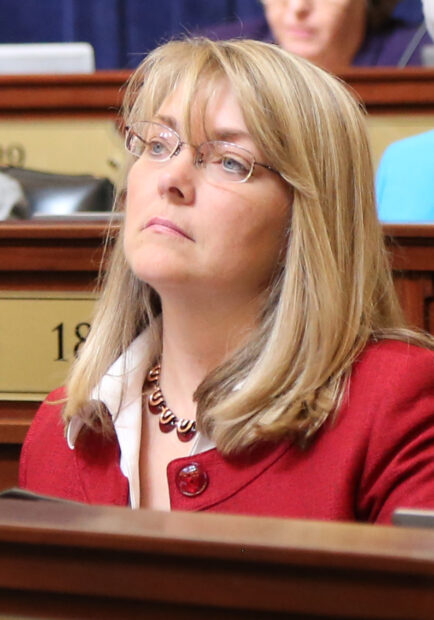A group of lawmakers is attempting to clear up legal ambiguities surrounding Idaho contract and purchasing laws.
Earlier this year, the Legislature voted unanimously to rewrite and update the Idaho Procurement Act, governing the 42,000 state contracts awarded annually.
Generally speaking, contracts valued at $50,000 or more “shall be made pursuant to an open competitive sealed bid process.”
But things aren’t entirely clear — based on exemptions in the law, interpretation of current law and lawmakers’ questions about the law. And it means more than half of the taxpayer money spent each year could fall outside the competitive bidding process.
In essence, there are two sets of rules for state contracts, based on the type of contract and who is responsible for awarding it.
For years, Idaho’s constitutional officers have been exempt from bidding and contract law. Superintendent of Public Instruction Sherri Ybarra falls under this exemption.
That’s not new or in question.
The exemption is on the books because the elected officials are held accountable by voters and should have the autonomy to perform their duties on the state’s behalf. In addition, Idaho’s Division of Purchasing is a small shop with limited personnel and resources.
But, during a meeting Thursday of the Legislature’s State Procurement Laws Committee, lawmakers said they have received numerous questions recently about which state agencies and commissions are subject to contracting and bidding laws.
“Some (agencies or commissions) may be subject to the procurement act, while others may not,” Committee Co-Chairman Neil Anderson, R-Blackfoot, told Idaho Education News.
Anderson said there are more than 100 state agencies and commissions, and he estimated that about a third of them are not subject to the law.

“There needs to be clarity on that and there is not clarity,” Anderson continued. “Something the committee is attempting to overcome is a lack of consistency, and that is something we are now in a position to address.”
Idaho’s contracting and bidding laws have been under the microscope since a district judge threw out Idaho’s statewide broadband contract after the state became ensnared in a costly, multiyear legal battle.
Going forward, contracting issues continue to affect education.
Ybarra and her staff have signaled that in the coming year or years, they are interested in updating or replacing a statewide reading test administered to kindergarten through third-grade students.
The process is just under way, but a reading test contract could run for years and be worth millions of dollars.
Due to the exemption, Anderson believes Ybarra may not be legally required to put such a contract out for an open, sealed bid process. However, Ybarra is always allowed to bid any contract and the education department’s own policies state that soliciting bids or cost estimates are considered best practices.
“Education is not under the purchasing act,” Anderson said.
Earlier this year, Ybarra exercised a contracting exemption to award a no-bid contract to an out-of-state temporary employment services agency. Under that arrangement, Ybarra’s chief policy officer Duncan Robb is an employee of the DePaul Industries temp agency, not the state of Idaho or the State Department of Education.
Ybarra used this arrangement because she had run out of money in her budget for salaries.

Robb’s contract is legal, but it surprised some of the Legislature’s top budgeting and contracting experts.
“I was not aware (Robb) was an employee of a temporary employment agency,” said Idaho Falls Republican Rep. Wendy Horman, who took the lead on writing Ybarra’s budget and the school budgets. “I don’t know if that is a common practice in state agencies, especially for cabinet-level positions.”
Anderson was equally surprised.
“I can see how that would raise some eyebrows,” Anderson said. “I have not seen other agencies do things of this nature. I’m not making a judgment call on it, but I can see that it is probably the type of thing that somebody would what to learn more about.”
“It may be perfectly defensible,” Anderson added.
Assistant Chief Deputy Attorney General Brian Kane, who addressed the committee Thursday, said the new contracting law did not affect the exemption for constitutional officers such as Ybarra.
When it comes to where else the contracting laws are applied, Kane said, “it’s complicated.”
Since the law’s passage, state officials said they have learned about several state commissions, agencies and quasi-government agencies that they didn’t know existed. Therefore, state officials aren’t sure what rules apply where and asked Anderson’s committee for specificity.
“We would wholeheartedly be in favor of definitive list of what is in (Idaho law and administrative rule) so we can be on the same page,” said Sarah Hildebrand, the administrator for Idaho’s Division of Purchasing.
The seven K-12 public school budgets account for about 48 percent of all general fund spending in Idaho each year. If contracts within those budgets are exempt — as well as contracts awarded by the six other constitutional officers — then well over half of all general fund spending is not subject to Idaho’s purchasing, bidding and contracting laws.
Even with exemptions in place, Anderson stressed that elected officers still must be accountable to taxpayers and businesses.
“I want to make sure that people understand that even though an agency doesn’t fall under the procurement act, it doesn’t mean they can act in an irresponsible way,” Anderson said. “It is just as important to get that across, that they still have to behave ethically and still have a fiduciary responsibility.”
The State Procurement Laws Committee is scheduled to meet again Nov. 17, and is likely going to bring legislation forward during the 2017 session.
Who are Idaho’s elected constitutional officers?
- Gov. Butch Otter
- Lt. Gov. Brad Little
- Attorney General Lawrence Wasden
- State Treasurer Ron Crane
- Controller Brandon Woolf
- Secretary of State Lawerence Denney
- Superintendent of Public Instruction Sherri Ybarra
